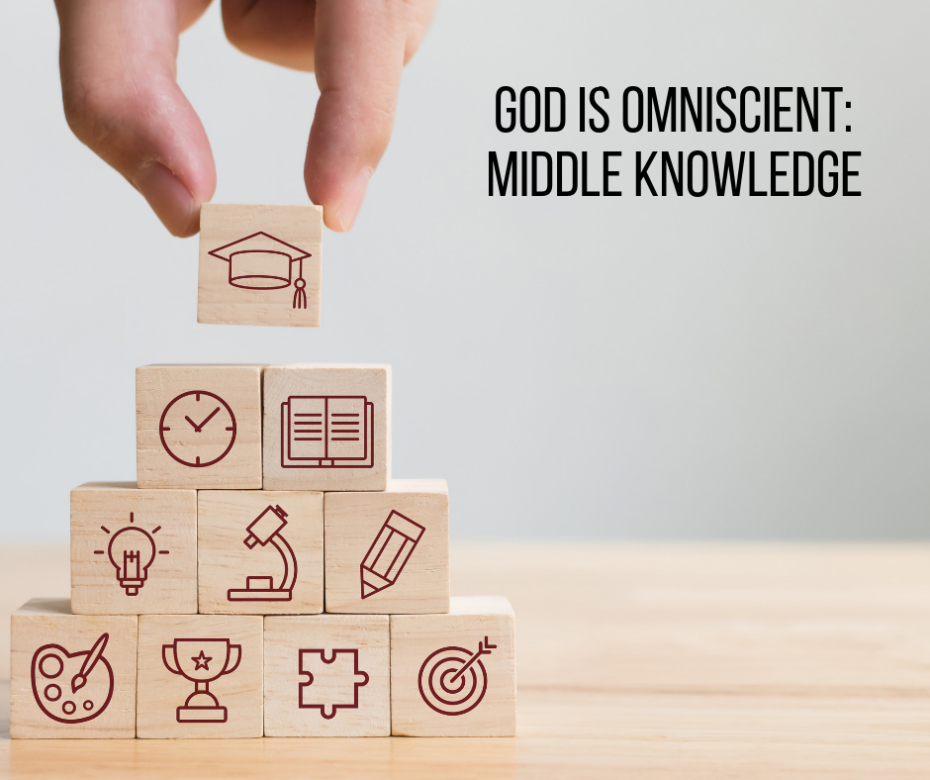Imagine that Laura is a doctor. Laura chose to become a doctor because her mother developed Lou Gehrig’s disease, and she had to learn how to care for her mother. That sparked Laura’s passion for medicine.
But what if Laura’s mother had never developed the disease? Would Laura still have become a doctor?
And is that something God could know? That is, does God know what people would have (not just could have) chosen if put in different circumstances?
Theologians call that kind of knowledge “middle knowledge.”
In between knowledge of everything that could happen and everything that will happen is everything that would have happened.
Does the Bible reveal whether or not God has middle knowledge?
Consider this episode from the life of David.
The Philistines were attacking the city of Keilah. David asked the Lord if he should fight them. God said yes (1 Sam 23:2), so David attacked the Philistines, thereby saving the city. However, David heard that King Saul was planning to come to Keilah to kill him. How would the citizens of Keilah react? Would they defend him, or deliver David into Saul’s hands? David prayed to God for an answer (and notice that David assumes God knows the future):
“O Lord God of Israel, Your servant has certainly heard that Saul seeks to come to Keilah to destroy the city for my sake. Will the men of Keilah deliver me into his hand? Will Saul come down, as Your servant has heard? O Lord God of Israel, I pray, tell Your servant.”
And the Lord said, “He will come down.”
Then David said, “Will the men of Keilah deliver me and my men into the hand of Saul?”
And the Lord said, “They will deliver you.”
So David and his men, about six hundred, arose and departed from Keilah and went wherever they could go. Then it was told Saul that David had escaped from Keilah; so he halted the expedition (1 Sam 23:10-13).
Do you see what happened here?
God revealed what would have happened if David had stayed in Keilah, i.e., Saul would have come, and the men of Keilah would have delivered David into Saul’s hands. Given that information, David left Keilah. Consequently, Saul “halted the expedition” and David was not delivered into Saul’s hands.
That’s one example of God’s middle knowledge.
Here’s another—
Jesus had ministered in the cities of Chorazin and Bethsaida with limited results, so He warned them:
“Woe to you, Chorazin! Woe to you, Bethsaida! For if the mighty works which were done in you had been done in Tyre and Sidon, they would have repented long ago in sackcloth and ashes. But I say to you, it will be more tolerable for Tyre and Sidon in the day of judgment than for you. And you, Capernaum, who are exalted to heaven, will be brought down to Hades; for if the mighty works which were done in you had been done in Sodom, it would have remained until this day. But I say to you that it shall be more tolerable for the land of Sodom in the day of judgment than for you” (Matt 11:21-24).
Jesus knew what Tyre, Sidon, and Sodom would have done had they seen His miracles, i.e., they would have repented.
That’s another example of middle knowledge.
Interestingly, God’s judgment of those cities will take into account what they would have done. Since they would have repented had they been given the same miraculous evidence, “it shall be more tolerable” for Sodom than for Capernaum.
What do we call a God who knows everything that would have happened in the world?
Omniscient.


